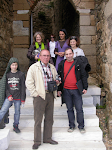Prisioneiros Portugueses na Índia, 1961-1962
The
Portuguese POWs in Goa (1961-1962)
Teotonio
R. de Souza
An young
Portuguese scholar, Diogo Roque,
presented a M.Phil. dissertation on this subject to the Department of History
of the Lisbon University on 27th
June. Invited to be on the board of
examiners, I had an opportunity to
appreciate the work first hand. The study identifies interesting issues.
The study covers
the surrender of the Portuguese armed forces on December 19, 1961 and the daily routine of the POWs in
provisional and definitive camps till their repatriation in May 1962. The
surrender was interpreted by the Salazar regime as a violation of its orders to
resist unto death. Consequently, the governor and the armed forces were subjected
to court-martial. Even some who resisted valiantly in Diu were considered for
posthumous award and most
were admitted for pension only in 2003,
nearly three decades after the restoration of democracy in 1974.
Diogo Roque
has sifted through most published memoirs of the detainees, and has checked them
against primary archival sources as well
as interviews with many ex-POWs still living and willing to talk about their
experiences. Very important is the use of archival sources, including reports of
the
Portuguese officers in-charge of the detention camps, collaborating with
the Indian authorities managing the camps. These reports are now preserved in Portugal. Also the PIDE (Portuguese security police) reports are preserved at the
Portuguese National Archives in Lisbon and have been tapped.
The study
refers to Krishna Menon’s initiative in
constituting a task force under chairmanship of the general D.K.Palit to
prepare a plan for invasion of Goa on short notice. General Palit is cited to confirm that some uncooperative
Goan officers were arrested. Valmiki Faleiro revealed to us recently the
identity of the Goans officers in operational command of the Operation Vijay, but we know little about
those who opted out or were kept out.
Some
publications by Goan authors do not figure in the Bibliography. Among these Leo
Lawrence’s Nehru Seizes Goa (1963), which contains important clues for
understanding the background of the conflict, but needs to be used with utmost
caution. This Goan served as Portuguese political agent to muster support among
the Goans in Bombay through the Luso-Indian Institute.
When
expelled by the Indian authorities from Bombay Leo was appointed assistant director of
Information and Tourism in Goa. He chaperoned the foreign journalists invited
by the Portuguese government to report on Indian threat of military action. Before
the annexation of Goa to India, Leo
Lawrence moved to Portugal and served for nearly two decades in the Portuguese Foreign Affairs Ministry, promoting campaigns aimed at denouncing
India’s occupation of Goa.
There are
other interesting publications that the young researcher could tap. The biographical notes of Pascoal
Menezes, published as Once More Upon a Time, wherein Pascoal refers to
Portuguese decision to return the gold shifted to Portugal by BNU. Tells us
that the BNU officials who came to Goa in 1991 brought also a letter for him.
They remembered with gratitude a payment of Rs. 5000 made by Pascoal Menezes to
buy the political freedom of five BNU managers in 1961. The letter promised to help
Pascoal Menezes during his visits to Lisbon. We are told that he tested the
promise more than once and did not find it wanting.
Diogo Roque
tells us that with the exception of a
single Goan police officer among the
POWs, most others accepted the Indian offer of freedom and integration in the
Indian police service.
The study quotes Portuguese claims that Goans enjoyed equal rights of citizenship as any metropolitan Portuguese, but seems unaware that the Portuguese major-general Pezarat Correia, who served in Goa as a commander of a Portuguese volunteer force sent in 1954, wrote that Goans enjoyed no such equality. They were not bound by compulsory military service as the Portuguese citizens were. For him Goa was protected by Portuguese forces of occupation.
The study quotes Portuguese claims that Goans enjoyed equal rights of citizenship as any metropolitan Portuguese, but seems unaware that the Portuguese major-general Pezarat Correia, who served in Goa as a commander of a Portuguese volunteer force sent in 1954, wrote that Goans enjoyed no such equality. They were not bound by compulsory military service as the Portuguese citizens were. For him Goa was protected by Portuguese forces of occupation.
To
conclude, one more interesting aside is that several Portuguese POWs wanting to
marry Goan women were refused permission
by the Indian authorities to do so. Would they be marriages of convenience? We
are told that the white Portuguese POWs did not seem to like the natives
imprisoned along with them and often looked at them as Indian spies.









Sem comentários:
Enviar um comentário